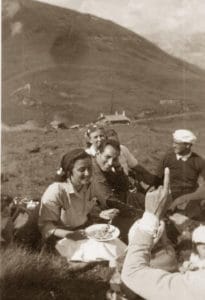“Once the Spouse had been revealed in a marvelous sunset, (…) I was touched anew by the Holy Spirit, whose kiss made me feel a sharp pain in my heart. (…) And the Spirit revealed Mary to me. If only I could send you an angel to tell you everything! But you are me, aren’t you?” Chiara wrote this on July 19, 1949. They were the opening words of her narration of what had happened the day before, just two days after beginning her experience of being in the Father’s bosom, in Paradise.
At the very beginning, she was able to tell Igino Giordani immediately what happened, while they were sitting on the red bench next to the Canali stream. Soon after, however, he had to leave, and she kept communicating her new discoveries to her companions with whom she lived. But even Giordani had the right to know them because they also belonged to him. He too was living in the unity that had been established with Chiara.
Therefore, she started to write to him regularly. Sometimes an illumination was so intense that she recorded her intuitions in many pages, which were full of notes that later served for a talk, a letter, or even an article in a newspaper. Other times, it was simply a poem, an outburst of her heart that could not contain its joy. She could not jealously keep the gift of God for herself.

For Chiara, communicating was necessary and consistent with the choice she had made more than six years previously, that is, since the community of Trent had started practicing the communion of material and spiritual goods, as the first Christians in Jerusalem used to do. What was imperative was quite clear: “When we feel the whole of God within ourselves (…) let’s be multiplied in our brothers and sisters, giving them all of ourselves, giving them everything, even God in us.”
Chiara was different from certain mystics who, against their will, in obedience to their confessors, wrote down all that God had given them to understand and live. Instead, she was more like Augustine, who bared his soul completely in his Confessions, or like Meister Eckhart, who taught mysticism to the people with an exquisite pastoral sense.
Chiara’s communication was not just a revelation of her experience of God, but a way of involving others in that experience, making them participate in it. She affirmed: “I described each thing so precisely to the focolarinas that they too ‘saw’ in the same way.” They “saw” in the sense that they were transformed: “These mysteries took place in me, Chiara, but no sooner were they communicated to the rest of the Soul (the many souls made one) than we perceived them to be shared.”
In her first letter to Igino Giordani, she wrote: “If only I could send you an angel to tell you everything!” However, there was no need for an angel: the two were one, and what one experienced, the other experienced. “But you are me, aren’t you?” Later, she explained: “We were one, even though distinct.”
Igino Giordani was the first to transcribe some of the writings of that period, especially those written to him. Several of Chiara’s companions carefully kept some handwritten pages. Then, typewritten texts were distributed to form the members of the nascent Movement according to the realities of Paradise. Some were even compiled into booklets.
Then, one day, Chiara ordered all these texts to be destroyed — first, so that no one would become “attached” — as they used to say in those days — to those papers, and, second, so that they would not be misinterpreted. She was convinced that no texts remained after that, just as she was convinced that everything had remained imprinted in their hearts.
Then, in 1961, she was asked to narrate what had happened in 1949, which, by that time, seemed ages away, and yet she described everything as if she had experienced it the day before. That talk was published in the magazine Nuova Umanità, and recently translated into English and published in the first issue of Claritas.

However, in reality, the original papers had not been burned. They providentially reappeared in the 1970s. In the meantime, Klaus Hemmerle, a German bishop and theologian, understood that the 1949 experience was not simply a “spiritual experience,” but also contained a rich doctrine. Therefore, he proposed reading together with others those texts, so as to draw from them new life and insights.
Chiara liked the proposal. Besides Bishop Hemmerle and Fr. Pasquale Foresi, she gathered around her a small group, and together they began to study in-depth what had happened in 1949. That was how the “Abba School” came about. For almost thirty years, scholars from various fields have come together – and still do – to study those writings and to formulate the doctrine they contain.
Thanks to the Abba School (the name refers to the first word that Chiara uttered on July 16, 1949, and that introduced her into the bosom of Abba, the Father) the real and proper editing of what today is the literary work known as Paradise ‘49 started. The writings of that period, between 1949 and 1951, are numerous, but which of them really witness the lived-out divine experience?
In the years during which Chiara presided over the Abba School, new texts reappeared and she examined them, saying: “This text expresses what at that time I was given to understand, but not that one.” The texts were all beautiful, but she had a sense of discernment. She chose them and ordered them in chronological and logical order. Thus, little by little, Paradise ’49 was composed. It is a book of light, perhaps the most precious gift Chiara Lubich has left us — a book that I believe is destined to become a classic of Christian literature.

A TASTE OF PARADISE ‘49
“Therefore, look at every person with love, and to love is to give. But a gift calls for a gift and you will be loved in return. Thus loving is to love and to be loved: it is the [life of the] Trinity.” This is the heart of the Gospel: Jesus’ “new commandment,” love, as a complete self-giving. In communicating her experience of God, Chiara gave us the most precious thing she had. Each one of us has something to give, and every gift is the way to reach the fullness of life, that of the Trinity, where life is mutual love, generating communion in distinction.




